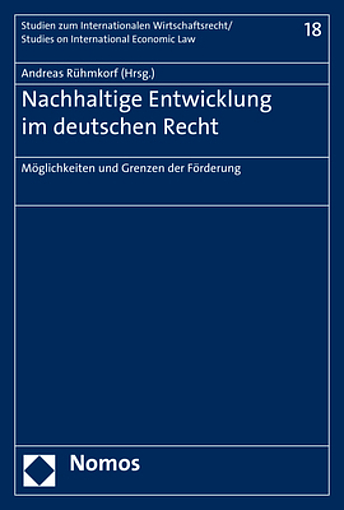englischThis book provides a comprehensive, up-to-date overview of the opportunities offered by the promotion of sustainable development in German law and the barriers to it. The book covers a full range of current issues on sustainability in both public and private law. Its target audience are primarily lawyers, but also researchers from related disciplines, such as management studies or politics, who are interested in sustainability.
Among the topics in the book are the discussion about the introduction of a legal form of social enterprise, sustainability reporting, the possible introduction of a new objective for sustainable development in the German constitution, the legal issues surrounding planned obsolescence (i.e. the intended reduction of a product’s life cycle) as well as political and legal control instruments for the promotion of sustainable energy consumption.
The book is edited by Dr Andreas Rühmkorf, Lecturer in Commercial Law, University of Sheffield.
With contributions by:
Professor Jean du Plessis, Deakin University Melbourne; Dr. Andreas Rühmkorf, University of Sheffield; Dr. Anne-Christin Mittwoch, Philipps-Universität Marburg; Dr. Sebastian Eickenjäger, Universität Bremen; Dr. Andreas Weitzell, Rechtsanwalt, München; Martin Lawall, Rechtsanwalt, München; Lena Volles, Westfälische Wilhelms-Universität Münster; Christian Dickenhorst, Universität Lüneburg; Katharina Gapp, Universität Lüneburg und HWR Berlin; Anna Brüning-Pfeiffer, Universität Lüneburg und HWR Berlin; Patrick Merkle, Rechtsanwalt, Berlin; Christoph Mayer, TU Kaiserslautern; Felix Brauckmann, TU Kaiserslautern; Sven Stumpf, Universität Erlangen-Nürnberg.
Der Leser dieses Buches erhält einen umfassenden Überblick über die Förderung nachhaltiger Entwicklung im deutschen Recht. Es wird untersucht, welche Möglichkeiten und Grenzen für die Förderung nachhaltiger Entwicklung in verschiedenen Gebieten aus dem Zivilrecht und dem Öffentlichen Recht bestehen. Die Beiträge decken eine Reihe aktueller Rechtsfragen zu Nachhaltigkeit ab und richten sich sowohl an Juristen, als auch an andere verwandte Fachbereiche mit Interesse an Nachhaltigkeitsfragen wie z.B. BWL.
Das Buch beschäftigt sich u.a. mit einer Rechtsform für Sozialunternehmen, Nachhaltigkeitsberichterstattung, der Frage einer Staatszielbestimmung nachhaltiger Entwicklung, dem rechtlichen Umgang mit geplanter Obsoleszenz (d.h. einer geplanten absichtlichen Verringerung der Lebensdauer von Produkten) sowie politisch-rechtlichen Steuerungsinstrumenten zur Förderung nachhaltigen Stromkonsums.
Herausgeber des Bandes ist Dr. Andreas Rühmkorf, Lecturer in Commercial Law, University of Sheffield.
Mit Beiträgen von:
Professor Jean du Plessis, Deakin University Melbourne; Dr. Andreas Rühmkorf, University of Sheffield; Dr. Anne-Christin Mittwoch, Philipps-Universität Marburg; Dr. Sebastian Eickenjäger, Universität Bremen; Dr. Andreas Weitzell, Rechtsanwalt, München; Martin Lawall, Rechtsanwalt, München; Lena Volles, Westfälische Wilhelms-Universität Münster; Christian Dickenhorst, Universität Lüneburg; Katharina Gapp, Universität Lüneburg und HWR Berlin; Anna Brüning-Pfeiffer, Universität Lüneburg und HWR Berlin; Patrick Merkle, Rechtsanwalt, Berlin; Christoph Mayer, TU Kaiserslautern; Felix Brauckmann, TU Kaiserslautern; Sven Stumpf, Universität Erlangen-Nürnberg.


